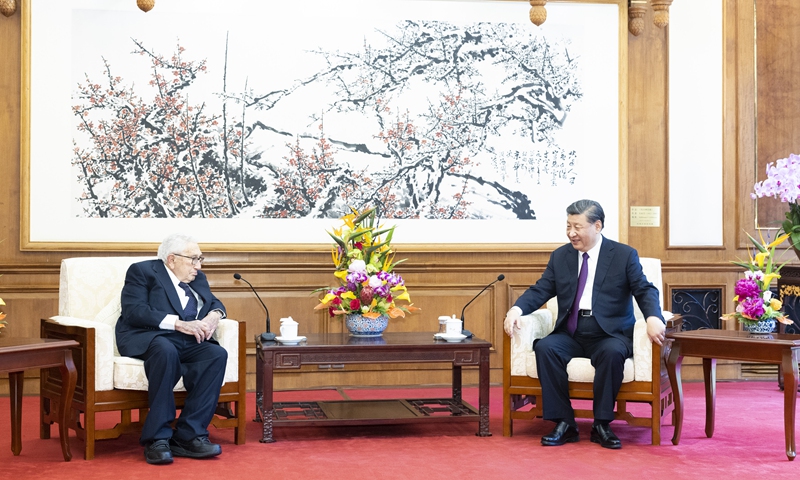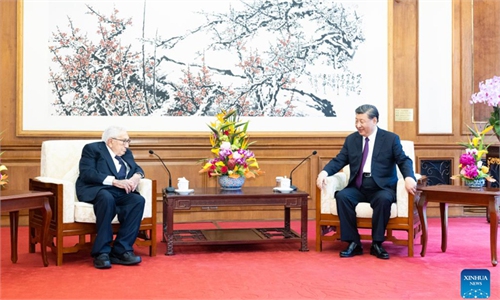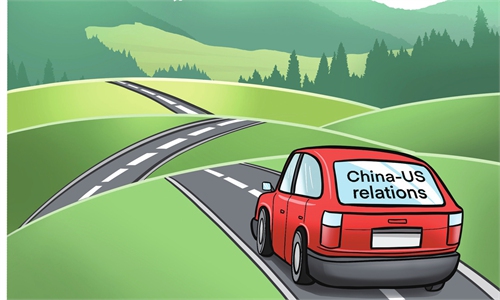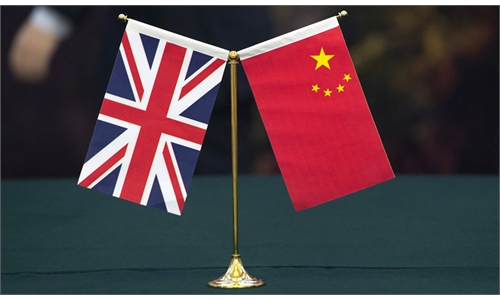Erosion of competitiveness makes it hard for US to repeat Cold War policy toward China

Chinese President Xi Jinping talks with visiting former US secretary of state Henry Kissinger in Beijing on July 20, 2023. Photo: Xinhua
Kissinger was one of the main architects of US foreign policy during the peak of the Cold War, making him one of the most qualified American elder elites to talk about that period. At that time, the US and the Soviet Union were in a state of intense confrontation. Kissinger pushed for the improvement of US-China relations, tilting the strategic balance toward the US. After that, the Soviet bloc became further isolated, with their competitiveness gradually depleting, leading to their internal turmoil and ultimate defeat in the Cold War.
Today, the US is engaged in simultaneous confrontations with both China and Russia. The new generation of American political elites attempts to replicate the Cold War framework and victory that Kissinger's generation participated in. However, the power structure and interests in the international arena have undergone profound changes, and the driving force of politics is also changing. This has led Kissinger to have certain doubts about the current US foreign policy, in particular advising his successors not to act recklessly in US-China relations.
The US will face greater difficulties in launching a new Cold War compared to the previous one. In the 1970s, the US' GDP accounted for nearly one-third of the global total, but now it is only one-quarter. Its two major rivals are a super nuclear power and an economic superpower. In order to defeat Russia, the US must ultimately overcome Russia's nuclear deterrence, which would be a thrilling adventure. Within Russia, there are already growing calls to enhance its nuclear deterrence to push back against the West. The US-led NATO expansion and maximum pressure on Russia can be seen as a gamble, and this gamble is approaching its climax.
Another gamble for the US is aimed at China. It is attempting to stifle China's development by imposing unlimited technological restrictions, but it dare not and cannot decouple economically from China. For the US and its main allies, China is either the largest single trading partner or one of the largest trading partners. Today, the US is a reckless strategic aggressor, seeking to wage a new Cold War in its weaker state by uniting its allies. It should be noted that the strength of the US' allies has also declined significantly, and the unity of the "West" is difficult to maintain due to the US shifting from being a "donor" to a "vampire."
Europe, which has been severely weakened, is trapped by security risks and filled with anxiety over its own development. They have significant interests in their relationship with China, making it impossible for them to adopt a united policy toward it that aligns completely with the US, while in the confrontation with the Soviet Union, Europe played a resolute frontline role, just as it does today in dealing with Russia.
Today's America and the West are not facing the same geopolitical challenges as the Soviet Union posed to them back then. Their problem lies in the erosion of their competitiveness, which has begun to decline. What they need most is self-repair. However, the US intends to reverse the clock of economic development through geopolitical means and reshape the world order of economic and technological competition. The endpoint of geopolitics is often war, and the risk at the end of war is nuclear conflict. Washington is pushing humanity into much greater uncertainty than in the previous Cold War era.
The US cannot handle such great uncertainty, and if human society rushes toward ultimate risks, humanity will face a dark future. This generation of American elites arrogantly seeks to replicate the victory of the Cold War, but they will never succeed. The US will face a different outcome.
The author is a Global Times commentator. opinion@globaltimes.com.cn




